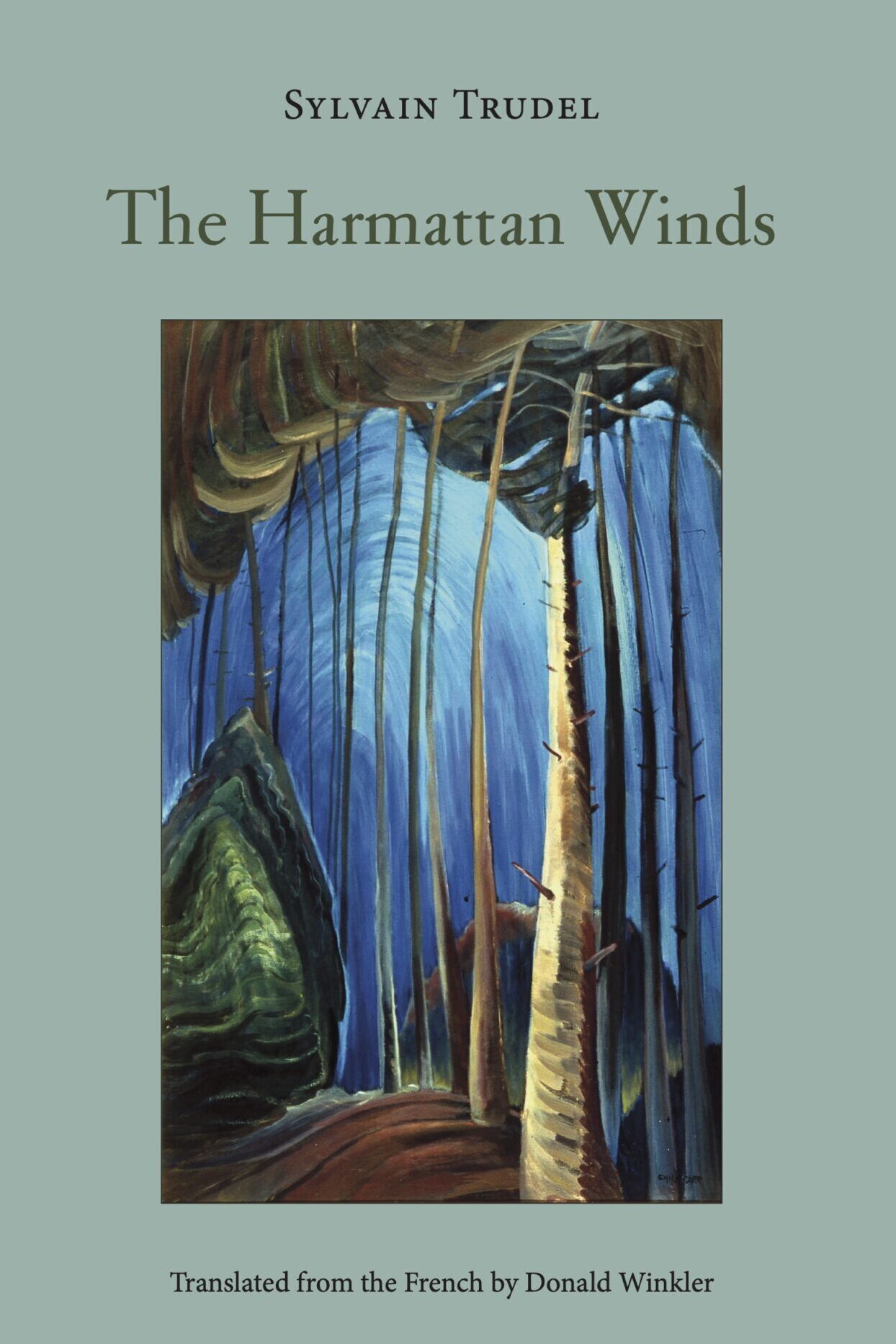The Harmattan Winds
by Sylvain Trudel, translated by Donald Winkler
reviewed by Gideon Leek
“We played the fool talking with long-legged words so as to mock the bastards who feed off human sorrow.” This is the mantra of Hugues and Habéké, the child heroes of Sylvain Trudel’s The Harmattan Winds, translated into English by Donald Winkler. Trudel published the novel, his debut, in the original French when he was 23, but given his young age, you get the feeling that he sourced a lot of it from his own juvenilia. At its core, the book explores a specific characteristic of precocious children: the dissonance between the things they can read about and what they can truly understand. But that idea itself is too limited to support a novel, and it makes The Harmattan Winds, at 152 pages, feel far longer than it should.
Most immediately noticeable about The Harmattan Winds, certainly more so than the plot, is the unconventional style: it’s written at about a fifth-grade level. This is intentional. Ten-year-old Hugues and Habéké are great readers—absorbing the work of real writers, like Russian author Aleksandr Solzhenitsyn, as well as fake ones, like the made-up Quebecois poet Gustave Desuet—but they cannot articulate their own thoughts at the same cognitive register. Hugues narrates with a lofty yet convoluted style, a child’s idea of extreme eloquence. He says things like, “when you heap up years inside your head then the real takes up so much space that you blind yourself to the invisible and your kingdoms all collapse” and “That night I came to understand that the insides of rootless men are steeped in exile.” Hugues has a tendency for the archaic and the inefficient: he refers to Habéké as having “a mere nine springs behind him” and to a piggy bank as “a pot in the form of a piglet.”
But Hugues’s greatest enemies are idioms. He knows far too many and understands far too few. “I was not the fruit of Adam and Eve’s imagination.” “One picture is worth only a thousand words, no more, because a picture is flat.” “We became the index finger and the thumb of the same helping hand.” “My shot in the dark had not fallen on deaf ears.” Your tolerance for such twisty language may vary, but it is, if nothing else, an impressive feat of translation, since clichés are not entirely cross-cultural. In the French, for instance, that last phrase is “mon appel dans l’immensité,” my call to immensity—the literal opposite of a shot in the dark, but similarly overwrought.
Hugues and Habéké have another thing in common: their “births as accursed bastards.” Habéké is an orphan adopted from Ethiopia. After his parents died in a famine, he went “fifty days without eating.” Hugues has been adopted too, although he never knew his parents. Found at six months, he might as well have been “born by the side of the road like a natural disaster incarnate.” Hugues’s parents are unknown, but his features are clearly not white. He has “almond eyes,” which, as another child notes, are “the same eyes as the big Mohawk who lives over the grocery store; or the cook in the Chinese restaurant.” The children are even harder on Habéké. “Howdy, big blackie toasted on both sides!” “How much do you cost, slavey? Do you have all your baboon teeth?” Habéké says only: “We blacks, we are the good Lord’s beauty spots.” For Hugues, even this negative response to Habéké’s heritage is preferable to nothing—“I was colorless, like dead meat or celery water, and I envied Habéké.” Habéké’s roots have been torn up; Hugues never fully rooted himself. Neither really belongs in Quebec.
This rootlessness gives the typical escapist games of childhood a different flavor. When they make wings from chicken feathers, they really are trying to fly away. (Before jumping from a bridge, Hugues, ever literate, reminds Habéké of the fate of Icarus: “Don’t forget, we can’t fly too close to the sun.”) They don’t just want to dig a hole to China, they want to do so to discover the origin of Hugues’s “father’s tiny eyes.” (This plan is foiled by Habéké’s poor math. What initially seemed to be “seventeen days of hard labor” is revised upward to “eight hundred and twenty-one years.”) They don’t go into the woods to camp out but to visit “the deepest heart of Africa.” (They bring swords and hockey pads.) In a bush they find bones. Habéké is certain they belong to the ancestral spirit of his great-grandfather. “A broken skull,” he says, “because [he] was a broken man.” Hugues admits “they may have been just fragments of a moose.”
“Man has a little aquarium in his entrails with microscopic fish that paddle around inside, and when a man eats, crumbs fall deep into him to nourish hope.” That’s a beautiful image and so is “He touched my hand with his. It was black on white, like writing,” but most of The Harmattan Winds is just puzzling. It’s a short, unfulfilling novel and not funny or insightful enough to justify the conceit. For Trudel, Quebecois culture is limited to hockey and O Canada, and Ethiopian culture is limited to starving and shamanism—and children, even bright children, are just dumb adults.
Published on May 7, 2025

